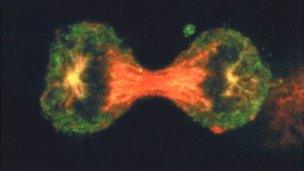Proteins discovery could aid cancer drug development
- Published

A cervical cancer cell on the point of division
New insights into how cells multiply could help scientists develop drugs to treat cancer, it has been claimed.
Edinburgh University researchers have been studying two key proteins which control cell division.
They have found a link between the proteins' activity and formation of new healthy cells, which could be vital to the development of anti-cancer drugs.
The team from Edinburgh is working in collaboration with researchers at Montreal University in Canada.
They have identified a key process in the way the proteins called "polo" and "aurora" work to divide cells correctly.
Their discovery will contribute to the development of new drugs which stop cancerous cells multiplying and so prevent the spread of the disease.
Dr Mar Carmena, of Edinburgh University's school of biological sciences, said: "Cell division is a complex and tightly regulated process, and when it goes out of control this can lead to cancer.
"The greater our understanding of the proteins that control cell division, the better equipped scientists will be to design more effective treatments against cancer."
- Published4 October 2011
- Published21 July 2011
- Published14 June 2010